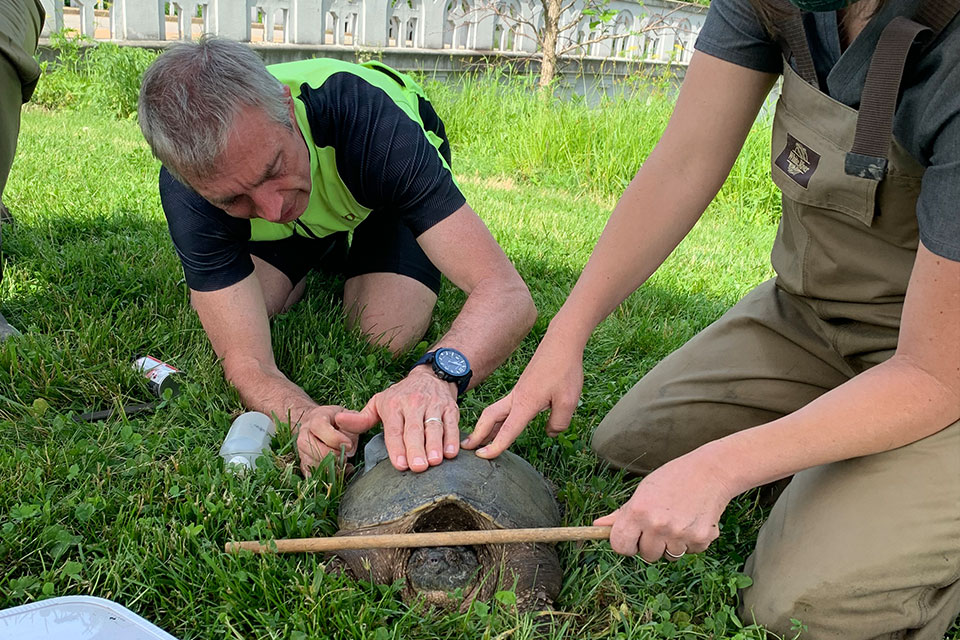Little Turtles, Big Tortoises: SLU Professor Publishes Papers with Conservation Focus for Both Animals
Stephen Blake, Ph.D., assistant professor of biology at Saint Louis University, has authored a pair of papers focusing on reptiles and potential future conservation efforts to protect the species.
Blake, in conjunction with Sharon Deem, D.V.M., Ph.D., director of the Saint Louis Zoo Institute for Conservation Medicine, published “Home Ranges of Box Turtles in a Rural Woodland and an Urban Park in Saint Louis, MO; Implications for Turtle Conservation” in Urban Ecosystems and “Temperature Along an Elevation Gradient Determines Galapagos Tortoise Sex Ratios” in Ecology and Evolution.
In both of these papers, Blake, Deem and their fellow authors explore how humans have impacted both of these species. In “Home Ranges of Box Turtles,” Blake examined how box turtles move in urban and rural environments, and how city planning can either protect or endanger these animals.
Not surprisingly, they discovered that roads pose the most significant danger to turtles. Through their slow movements — and the abundance of cars and the high rate of speed at which they travel — traversing a road to get from one place to another can have dire consequences more often than not.
“If you look at Forest Park from Google Earth, you see islands of forest in an urban ocean,” Blake said. “And most of those little islands and forests have turtles. We need more conservation efforts for these animals because these roads pose a huge threat.”
While conservation efforts such as building specific crossing structures for turtles and other animals in cities is impractical, Blake and the rest of the team pose some solutions to help aid in the conservation of turtles, on top of what is already being made by the Missouri Department of Conservation.
“When you see a turtle on the road, move it to the side of the road it's headed,” Blake said. “Don’t move it to the side it came from because if you move it back, it's just going to cross again. Don't take box turtles out of their environment either; just leave them alone. If you want to have one as a pet, have it as an outside pet. But if you remove it from its environment, it’s going to try and go back home, and it will inevitably have to cross a road.”
While most box turtle species are not considered endangered by the National Wildlife Federation, Blake said humans don’t often think about what causes animals to become protected. According to Blake, there are easy steps humans can take to maintain a species that connects so many people in the region.
“We just don't think about the consequences of our actions at any level as individuals,” Blake said. “You might think about it when it comes to grizzly bear habitats, but who thinks about it when it comes to wonderful, local nature? The more we pay attention to what’s happening in our own neighborhoods, the safer it will be for our local wildlife.”
Much like their smaller brethren across the globe, tortoises in the Galapagos Islands are also being affected by human actions. Deem, Blake and colleagues researched the famous tortoises on the islands and found that global warming may influence tortoise sex ratios as temperatures change. During their study, they found eggs that hatched in cooler high-elevation nesting zones had more male than female juveniles. But tortoises are more likely to be female in the lower elevation, which were warm nesting zones.
“The change in sex among the eggs is due to temperature-dependent sex determination in tortoises,” Deem said. “With climate predictions of warmer temperatures in the Galapagos, we may find that more female tortoises are hatched than males. This will skew the sex ratio to more females.”
While more research still needs to be done, Deem said climate change mitigation is imperative to ensure the planet's and its species' survival. Plenty of other factors determine sex, but if humans continue to accelerate climate change, the effects will continue to be debilitating.
“Amazing creatures, like box turtles and Galapagos tortoises, are out there keeping our ecosystems healthy and are being impacted by roads, by climate change,” Deem said. “Conservation of these animals is so vital, and SLU and the Saint Louis Zoo are working together to preserve animal species around the world. We need turtles and tortoises on our lands and in our oceans.”


















